We went up into the foothills, near the caves. We didn’t dare go too close for the fear that the caves would be watched now. I wasn’t sure if I’d even remember how to get to them and was scared we might stumble on them by accident.
We didn’t. Veliko was a big country, and the hills spanned almost its entire western side, like the spine of a book.
Here, we started creeping northward (in the hills, we could not run as fast as we could on the flats, of course), and the temperature began to drop. Not precipitously but noticeably. It was still spring, but spring in Gorakino was just the second part of winter.
I caught myself watching Sanya move whenever my attention wandered. Watching for a limp. When he sat down I listened for his bones creaking. When we got up in the morning, I looked to see how quickly he could get to his feet. Sure, he’d been training for eighteen years, but he’d mostly been working on a farm. I didn’t know too many farmers who made it to middle-age spry and sprightly. You couldn’t train your body out of aging.
We had to start thinking more seriously about the border.
Perhaps we could’ve gotten through with our identities from before, but we had planned it this way, knowing that the first set of border guards might have poked at our story enough to send it tumbling down.
Sanya may have been Gorakino-born and bred, but everything he knew about how they kept the border was eighteen years old. When I first started causing trouble, it, like every other border with Veliko, was strengthened. New guard towers were erected between crossings. Patrols were increased. Natural barriers were fortified, but the easy passages were the most heavily reinforced.
We would not be going through the easy passages, then.
Deep into the foothills, we came to the end of a ravine carpeted with jagged rocks from years worth of rock slides. Its sides stretched up maybe fifty feet at its mouth, but it deepened as it went back into the hills. In the winter, Sanya said, everything uphill was frozen, but when spring hit the mountains, the snowmelt would start to funnel down and create a roaring river of the trickling stream that now wound its way through the rocks. This, I thought, must have fed the river we had used by the caves. It overran its banks in the late spring and early summer, and in the winter it was nothing but a lazy worm of water on a bed of bleached rocks.
It was dangerous to go up the ravine now. The land around it was full of loose rocks that were wont to slide. With the snowmelt and the spring storms, the ravine could become a death trap in moments. It was difficult land to build on, difficult land to guard.
So up the ravine we went.
The guards, both Sanya and Aksana surmised, would be placed on either side of the ravine where the land allowed, looking down into it. It was not wise to put yourself in a bowl, ready to be scooped up and eaten. Eagles hunt from the sky for rodents scurrying below.
But when one has to be a rodent, one might as well take lessons from them. They burrowed, they stayed close to the ground, they had fur that helped them blend in with the dirt.
We changed into clothes that were a dusty dun color, hoods and hats, too. We coated ourselves in dust, which was easy to do scrabbling up the rocky ravine.
There was barely any vegetation on the ground. The rocks had not settled in one place long enough for plants to grow up through them, so there was little cover but for the bigger rocks themselves. We stuck to the sides of the ravine, where it was harder to see us from the edge above and tried to use the rocks as cover from watchers on the opposite side.
It was very slow going. I thought we might be stuck crawling up the ravine for years and wanted to suggest that we climb out of it and come back down when we got closer to the border, but climbing in and out of the ravine was no easy task, and Sanya rejected the idea emphatically (though I wasn’t sure if it was because he was worried he couldn’t climb out or because he wanted to prove that he could navigate the ravine’s floor). The rocks were loose everywhere. For how large and deep, how impressive and unmovable the ravine itself was, it was a fragile structure, constantly on the verge of collapse, wanting to swallow the rest of the world into itself.
We slept in shifts, not just to watch for the watchers but to watch for rain, listen for thunder from the west or the scraping that would be the first hint of a landslide to come.
On the second day in the ravine, we saw a pair of watchers on the north wall.
I was the one who first spotted them and pushed Sanya back behind the boulder from which we were just emerging.
There were two of them picking their way along the unsteady ground at the ravine’s edge, kicking rocks that went tumbling end over end down the wall.
Sanya and I pressed ourselves to the backside of the boulder and waited. They were going east while we headed west.
I suggested we sleep during the day behind cover and move at night instead, and to my surprise, Sanya agreed. It made me nervous that he did: we had advantages over a miryanin, to be sure, but it was still more dangerous to move at night on such hazardous terrain; that Sanya accepted my suggestion so readily told me that he was very nervous indeed about the watchers spotting us, much more so than his words or face conveyed.
It was hard to find places to sleep comfortably here, and Sanya was very particular about how he slept. But Sanya would have to learn how to sleep like a creature of the land and not a sea-dwelling crustacean one of these days, and now was as good a time to start as any. I took the first watch.
***
By the time Sanya shook me awake, the sky was a dusky purple but the ravine was dark as full night.
The going was, as anticipated, slower and we used up energy sharpening our eyes enough to see in the dark, plus it was getting cold.
But in the dark we could see the watchers by their lanterns. If we weren't at the bottom of a pit, we might have been able to see the lights from the guard towers—might have been able to tell how close we were to the border.
It was perhaps halfway through the night when two things happened almost simultaneously: First, we heard thunder. Second, we saw, up ahead of us, a tall wall of stacked boulders that reached halfway up the ravine’s sides.
Above it a bridge spanned the canyon, and on the south side—our side—a light burned in a tower.
This was the border. This was all we had to cross.
But then there was the thunder.
I looked up at the sky and could see no hint of stars. A cold wind blew down the mountain.
“We should keep going, right?” I whispered. “All we have to do is get past that wall. We can probably do it before it floods.”
Sanya hmmed.
“It’s not even raining. Maybe it won’t rain at all. Sometimes it thunders without rain.”
“It’s raining up-mountain already.” He nodded at the stream in the center of the ravine. It was swelling, thickening, twisting like a rope. “We’ll be going straight into the flood.”
“So, what? You want to turn around?”
“No,” he said. He did not elaborate, so we just kept going, now at a faster pace, which meant we slipped more and made more noise, but the noise was soon to be all but immaterial.
We were within a hundred yards of the stone wall when the rain started. First, a fat drop on my hat that I prayed was the rare nocturnal bird emission. I was not long to hold onto that hope, for close on the heels of the first came more. All over. Fast, and close together.
In a matter of seconds, both we and the ravine went from bone dry to sopping wet, and still, the wall was out of reach.
I didn’t notice I’d stopped, squinting up at the sky as though I could calculate when the clouds were likely to run out of rain, until Sanya grabbed my arm and pulled me along behind him.
As we stomped down the ravine’s natural wall to the unnaturally stacked stones ahead of us, I saw the water rushing to the ravine’s nadir. The stream was expanding like a ribcage on a big inhale. The ground here did not absorb water.
Sanya was all but running now, and I had to jerk my arm out of his grip to maintain my own balance over the slippery rocks. Any hope of us being discreet was now left entirely to the night and the thick sheets of rain.
Sanya leapt onto the rock wall at the corner where it met the side of the ravine.
He was panicked, I noticed vaguely in the back corners of my mind as I followed his footholds.
We did not have any climbing gear with us. Sanya was going quickly nonetheless, but he kept pausing, shaking out his left hand.
Below us, the water rose.
Sanya's foot slipped on a wet rock, and I nearly flung myself from the wall in an attempt to catch him, but he caught himself, and for a moment both of us clung there, hugging the rocks.
“Can you keep going?” he called down to me. He had to yell for me to hear him over the rain, and I tipped my head back. I could just see the glow of the guard tower lights sputtering in the rain.
I wasn’t sure if there were volshebniks here. Hopefully, even if there were, they’d be sheltering inside.
“Have to,” I said, gritting my teeth. If he couldn’t hear me, he intuited my response.
Fuck me, I wasn’t going to let some pile of rocks be the end of us.
I kept climbing, watching his limbs move almost as much as I was watching where I put my own. If I didn’t hesitate, if I just kept flinging myself upwards against the dark rocks, it was easier. If I didn’t think about falling down but instead treated this like I was falling up, it was better.
Thunder rolled overhead, rumbling from west to east. Who would look down into the ravine in this? Just stay in your guard house where it’s warm and dry.
I stretched to slip my fingers into a crevice and pulled myself up. When my foot left the rock below me, the rock shifted, and the whole structure seemed to shift and groan with it.
I moved my hand to the top of the rock just in time to avoid my fingers being crushed. We were perhaps twenty feet from the top. Sanya was looking down at me. Checking to see if I was still there, I supposed. I started climbing again, and he went back to work, too.
When he got to the top, I heaved a sigh of premature relief. It was only then that I realized my arms were shaking. Or was that the wall?
Sanya reached over the edge, grabbed my arm, and helped me pull myself up after him.
I didn’t stop to catch my breath before scrabbling across the uneven ledge (not much more than four feet across at the widest) and looking down.
At the bottom of the ravine, water beat on the rocks, waves rolling in and being repulsed, forcing their way through the cracks, trying to force their way through the rocks themselves.
“Does this happen every time it rains?”
He didn’t respond. He was massaging his left hand and watching the guard house lights struggle to keep themselves lit.
Try as I might, I couldn’t see anyone up there through the pouring rain. But that didn’t mean they hadn’t seen us.
My hood had fallen back as I climbed, and I pulled it up now, then reached out to fix Sanya’s for him. “We can try to stay up high on the sides of the ravine. Surely the water won’t reach this high up.”
“No. We have to get out now, before the ground gets sodden. It might be too late already. We have to go now.”
“Up there? Sanya, they’ll see us.”
“Possibly, yes. But if we stay in the ravine, the land will start to slide, and we’ll be crushed under it or pushed into the water. We’ll be dashed on those rocks or drowned.”
As if to punctuate his point, the wall under our feet trembled.
The sides of the ravine were steep but not vertical, not impossible to scramble up in good weather. Now, the rocks slid under our feet, and I was not halfway up before my knees and hands were torn open and every inch of me was coated in the pasty mud the rain had made of the dust. But at this stage, the rain had just begun to make the dirt under the rocks wet, and that helped us dig our feet in.
I thought we were home free until, close to the lip of the ravine, I took a step, and my boot stuck. The mud had gone from soft to soup, and the land began to slide.
Above me, Sanya lost his footing. I saw it happen, but before I could register it, he was hurtling past me.
I launched myself at him.
I caught his arm, my other arm thrust deep in the morass. Something popped in my shoulder, my arm sucked out of the mud, my fingers slipped on Sanya, and when we both came to a stop halfway down the ravine, we were stuck facedown in six inches of the muck.
I burst out of it, gulping air and mud both, and helped free Sanya.
To the south, lightning struck, illuminating the roiling clouds and the blood on Sanya’s face.
Now, the ravine was trying to suck us back in, to swallow us. Without zhiva, my muscles were trembling. Every step we took, the earth opened up around us and begged us to stay. Stay in the ravine. Above us, the rain still beat and the thunder rolled. Below us, the water rose and the rock wall groaned.
The mud pulled us a step back down the slope for every two we took up. It was starting to move faster, but we could not.
“Sanya!” I cried. “I have to stop for a minute.”
“No!” he said, but I was already pulling the returner from my pocket, and when he saw what I was doing, he stopped. I tossed him a bottle.
I was sliding back down the ravine as I did it, ever closer to the now-rushing water. I pulled the zhiva from myself and my eyes rolled back, the darkness around me deepened.
I caught myself just before my face hit the mud, before my consciousness slipped and I with it, into that watery grave.
Woozy, half-delirious from the transfer of zhiva, I propelled myself from the muck with all the strength I could muster.
Speed was what we needed. The less time we spent touching the ground, the less chance we had to get stuck in it. We ran. Leapt. The ground rolled and pitched under us. Sometimes we could get no traction, but sometimes we found enough on a sliding rock to propel us forward. We found enough.
The time, it was I who pulled Sanya up over the lip of the ravine.
We scrambled back from the edge where the earth still threatened to retreat under us. I thought, for a moment, that it was done. I began to let out a shaky, delirious laugh, until I looked at Sanya and saw his eye widen at something over my shoulder.
I spun and threw up a shield a moment after he did.
The drowning wave of myortva drove us back, tumbling, deep into the mud.

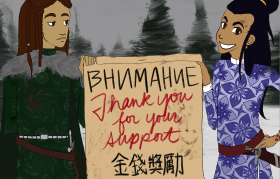
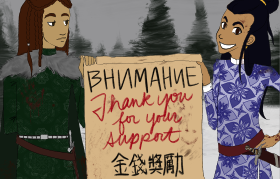
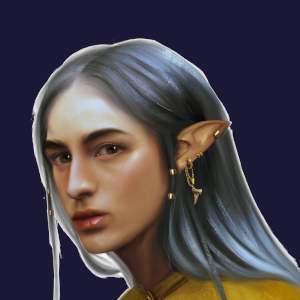
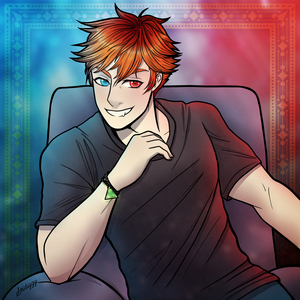







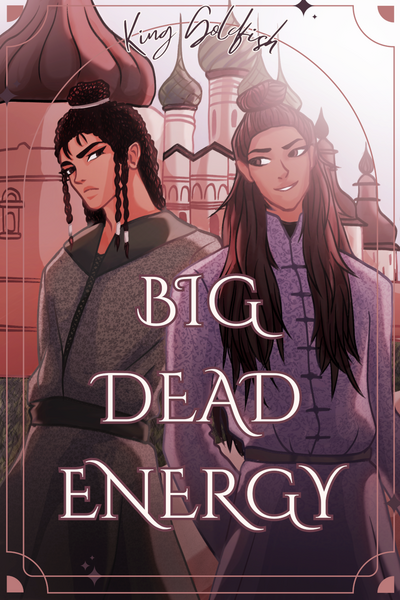
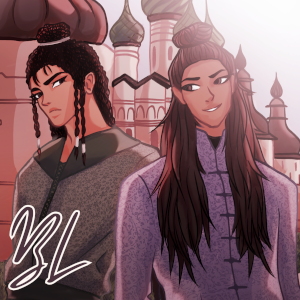
Comments (8)
See all